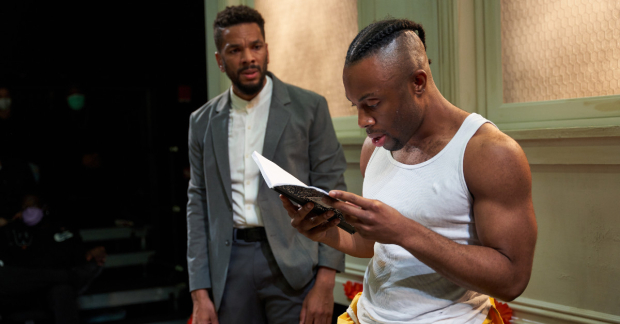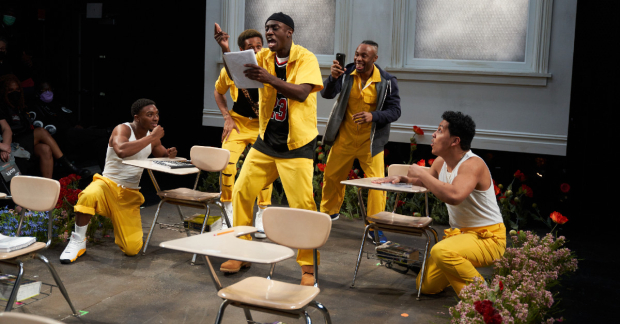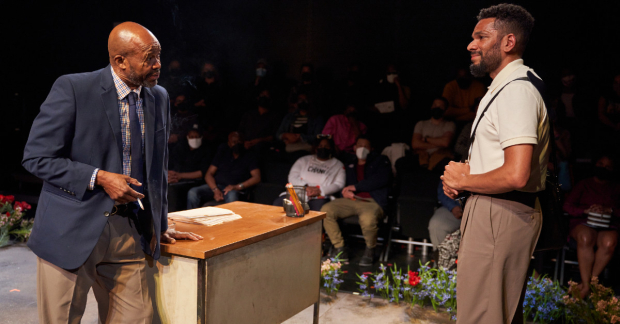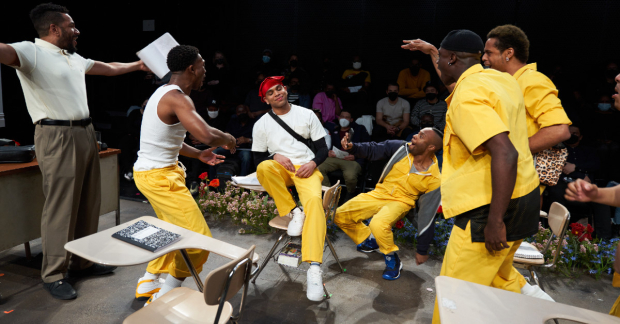Review: Finding a Place to Blossom in a Hard World in Soft

(© Daniel J. Vasquez)
What does the word "softness" mean to you? That question is posted outside the theater entrance to Donja R. Love's new play soft, now running at the Robert W. Wilson MCC Theater Space under the direction of Whitney White. It can be answered in countless ways (as you can see from the numerous answers on Post-its affixed below the question), but Love has some specific notions in mind as they pertain to people of color and to the Black and Latino students and teachers who inhabit his stunningly performed, if overburdened drama. I say "overburdened" because despite a production that is as emotionally engaging as anything I've seen in recent months, soft feels as though it contains more than it can comfortably hold, with a story that takes us to an emotional peak with several brilliantly drawn characters and then leaves us stranded at the top.
At the center of it is Mr. Isaiah (Biko Eisen-Martin), a literature and writing teacher at a juvenile boarding school (read: correctional center) who has had his own youthful run-in with the criminal justice system but is certain that he can make a difference in young lives now that he has his act together. That proves to be a big challenge with the six students he's been tasked with teaching Othello and poetry. They've grown up hard, and the fact that Mr. Isaiah makes big inroads with them counts as a win in the eyes of his boss Mr. Cartwright (sterling performance by Leon Addison Brown), who literally bears the scars of his own teaching days. But when star student Kevin (Shakur Tolliver) takes his own life, rage and confusion overwhelm his peers, and Mr. Isaiah must come to terms with how he has failed his students and maybe also the other people in his life.

(© Daniel J. Vasquez)
As he has done in previous works such as Sugar in Our Wounds and Fireflies, Love sets up a realistic scenario then infuses it with his poetic sensibility. On a traverse stage (scenic design by Adam Rigg), we see a no-frills classroom that speaks to underfunded education in American schools — not to mention centers like this — yet around the depressing room are an abundance of flowers, which the students can't see but which exist in some unseen realm all around them.
It's not much of a stretch for us to see these flowers as representations of the youth who inhabit this otherwise dismal scene but who do not have the luxury to indulge in any flowery "softness" — because in their world to be soft means to be trampled. "The weight of what those boys need will crush you," Mr. Cartwright tells Mr. Isaiah. We can see the world's weight ready to crush these students too if they step out of fighting stance.

(© Daniel J. Vasquez)
Eisen-Martin does a fantastic job conveying the ambivalence of a man who has never quite left that stance behind, trapped between the demands of a job that practically sets him up for failure and his students' needs (the raggedy textbooks beneath each chair are emblematic of how little these young people are valued by society). Dressed in yellow jumpsuits that seem one step away from orange prison attire (Qween Jean's costume design gives each student their own take on this outfit), the rest of the cast also bring their A game. Dharon Jones plays the sullen Antoine who has learned to channel his emotions into his drawing and withdraw from the world. His previous relationship with Kevin sets him at odds with nonbinary Dee, played by Essence Lotus with humorous energy and fine-tuned precision.
These and the other performances are also some of the most physically taxing I've seen of late, with the students and Mr. Isaiah often coming to blows in some extraordinarily well-choreographed fight scenes (fight direction by UnkleDave's Fight-House). Travis Raeburn gives one of the show's most concrete performances as the life-hardened, homophobic-posturing Bashir, who desperately wants but is too guarded to blossom, and who's ready to duke it out with anyone who talks about his girlfriends and children. Jamal, played with quiet intensity by Dario Vazquez, knows the secret behind Antoine and Dee's animosity and why they scuffle. But Eddie (Ed Ventura in a masterful performance that switches on a dime from drowsy to off-the-wall fury) couldn't care less about any of it as long as no one wakes him from his alcohol-induced sleep; if they do, it's on.

(© Daniel J. Vasquez)
With all these precisely drawn characters and intricate backstories, Love has given us more than a mere 100 minutes of theater can hold. This may explain why I was so surprised at the end when the lights came up on the cast taking their curtain call. At the heart of soft is Love's desire to have people of color be seen and given a space in which to bloom. A final, surprising epilogue takes the play out of its realistic milieu and into an otherworldly place that does just that (a thunderclap designed by Germán Martínez and red lighting designed by Cha See usher us into this mysterious place). We saw a similar sort of ending on Broadway in the most recent version of Antoinette Nwandu's Pass Over; however, that play's consistent biblical references made the ending somewhat less of a shock. Here, the shift feels incongruous, and despite the beauty of this scene (which involves the participation of some audience members), we're left wanting to know more about those who have been left behind in the real world. How will they fare? Will they ever blossom? This, for me, was a rare instance of desperately wanting an Act 2.
That said, this play held me by the throat the entire time. The topics that Love explores during the play — homophobia, suicide, HIV, Mr. Isaiah's extended lesson on the N-word, to name a few — benefit from his exquisitely well-honed dialogue. But between those big issues and the large cast of characters, he does only some of them justice — perhaps the source of questions for another play.











